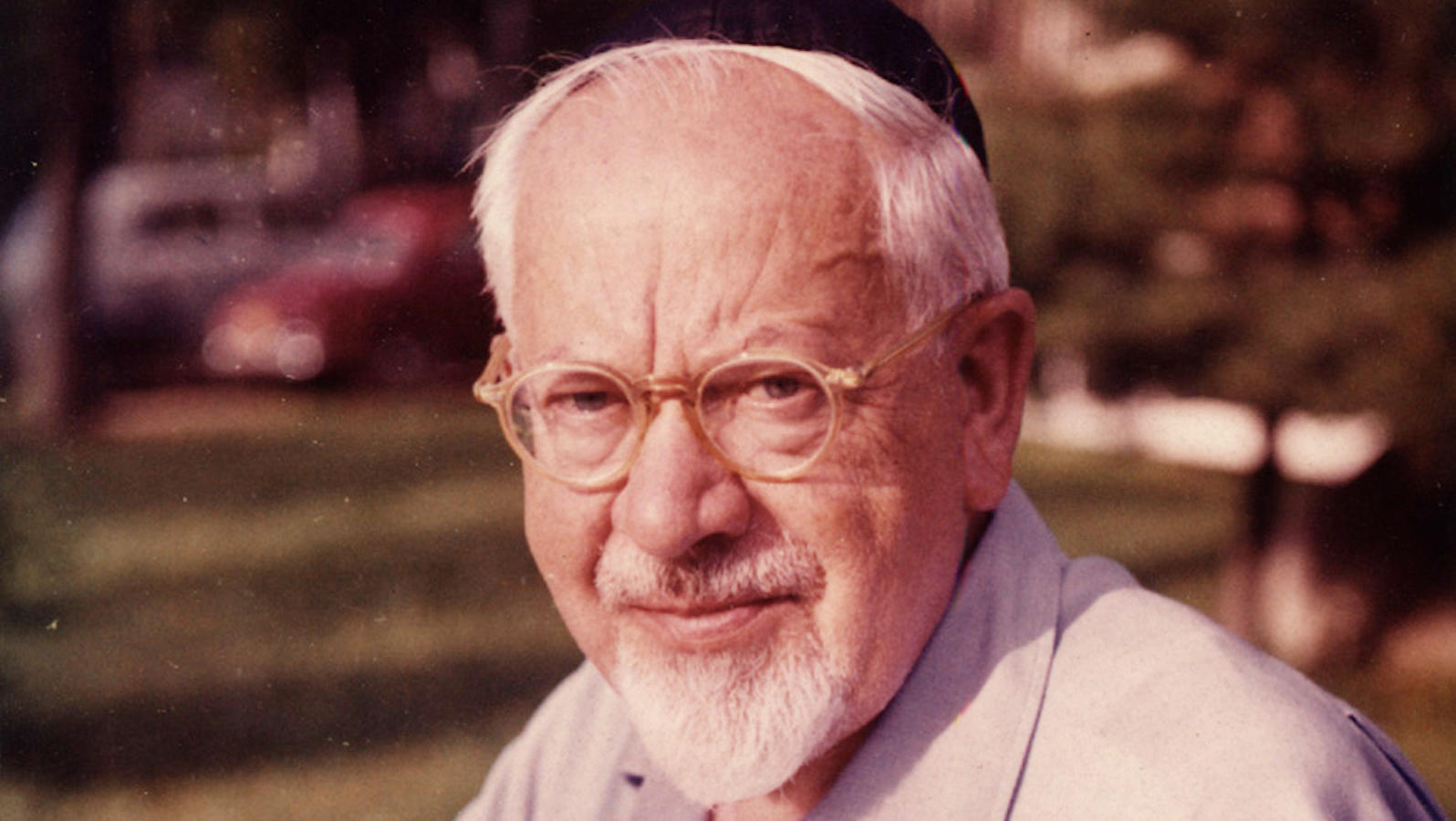[Mordecai] Kaplan was born in 1881 in the small town of Svencionys, in the Lithuanian district of the Jewish Pale of Settlement in tsarist Russia. At the age of 8 he came to the United States with his family. Kaplan’s early religious education was traditional, but he attended public school and Columbia University where he absorbed a modern critical approach to religion and to the Bible. After ordination from the Jewish Theological Seminary in 1902, Kaplan served as rabbi of an Orthodox synagogue in New York until, in 1909, he was appointed dean of the newly established Teachers Institute of the Seminary and soon afterwards also made professor of homiletics, midrash, and philosophies of religion. During his more than fifty years on the faculty of the Seminary, he attracted a devoted student following and, at the same time, maintained an extensive involvement in Jewish communal activities.
In 1917 he became leader of the first synagogue to incorporate a broad range of cultural and recreational activities into its program. After a split developed in the congregation over his innovative views, he and his supporters left to organize the Society for the Advancement of Judaism (1922),a New York synagogue and Jewish center based on Kaplan’s position that worship was only one of the functions that a congregation should foster.
His first major book, Judaism as a Civilization (1934), contained a detailed criticism of existing Jewish movements and a call for the “reconstruction” of Jewish life, leading him and his associates, the following year, to publish The Reconstructionist, a journal of Jewish affairs that has made considerable impact on the leadership of non‑Orthodox American Jewry. In the 1940sand 1950s, the Jewish Reconstructionist Foundation issued a series of new liturgical texts: a Passover Haggadah and prayer books for the Sabbath, the high holy days, and the festivals. In 1968, the Foundation opened the Reconstructionist Rabbinic College in Philadelphia with a curriculum arranged according to priorities that the movement felt were not adequately espoused by other forms of American Judaism. Thus, in Kaplan’s later years, Reconstructionism was transformed from an ecumenical position cutting across Jewish denominational lines to a small separate movement.
As previously noted, the starting point for Kaplan’s position is his critical evaluation of the main tendencies of American Jewry, especially, their inadequate view of Judaism as a totality. According to Kaplan, Reform rightly recognized the evolving character of Judaism but ignored the social basis of Jewish identity and the organic culture of the people. At the other extreme, Neo‑Orthodoxy recognized that Judaism was a complete way of life and provided a substantial Jewish education for children (something noticeably lacking in Reform), but considered the Jewish religion to be timeless and static.
Congenial to Kaplan was Conservatism’s commitment to the scientific study of the Jewish past, its sympathy for Zionism, and its concern for the unity of the Jewish people. However, Kaplan eventually came to feel that the Conservative movement remained too closely bound by the traditional methods and contents of the halacha [Jewish law] and was not adequately responding to new conditions and needs. (According to Kaplan, Jewish law is to be respected, but it has “a vote and not a veto,” so that precedent must, at times, give way to deliberate enactment.) The solution of the present‑day confusion was a definition of Judaism as “an evolving religious civilization.”
The practical side of Kaplan’s position called for the re‑establishment of a network of all‑embracing, “organic” Jewish communities around the world that would ensure the self‑perpetuation of Jewish identity and further secular as well as religious components of the Jewish heritage (art, music, philanthropy, and so on). Membership should be strictly voluntary, leadership would be democratically elected, and private religious beliefs would not be infringed upon, because diversity in modern Jewish life must be cherished. (Kaplan is a strong advocate of cultural and religious pluralism, and he maintains that American Jews should participate fully and creatively in both Jewish and American civilizations.) To clarify the international status of Jewry, Kaplan proposed a world‑wide Jewish assembly that would adopt a formal covenant defining the Jews as a transnational people, the hub of which was Zion and the spokes the branches of the diaspora.
However, Kaplan is not a secularist: Religion, the concretization of the collective self‑consciousness of the group, is an essential dimension of a civilization and a necessary component of an authentic and satisfying modern Jewishness. The religion of a group is manifested in “sancta,” spiritual symbols such as persons, places, events, and writings, which inspire feelings of reverence, commemorate what the group feels is most valuable, provide continuity through the flux of history, and fortify the collective conscience of a people. Kaplan felt a deep attachment to Jewish sancta and Jewish religious literature.
In order to hold the loyalty of a new generation of Jews educated in scientific and democratic principles, however, the Jewish tradition must expunge authoritarianism, dogmatic claims of infallibility, and recourse to supernatural revelation. (By supernaturalism, Kaplan meant God as a substantive, anthropomorphic entity and miracles as the divine suspension of the laws of nature.) The most important personal function of religion is to answer the question, “What shall man believe and do in order to experience that life, despite the evil and suffering that mar it, is extremely worthwhile?” Religion is the pursuit of salvation, which Kaplan defines in a humanistic, this-worldly way
In Kaplan’s frequently reiterated statement, “God is the Power that makes for salvation” or as he sometimes puts it, “God is the sum of the animating, organizing forces and relationships which are forever making a cosmos out of chaos.” For Kaplan, the idea of God must be viewed not metaphysically but functionally, in terms of its effects on human life. “We learn more about God when we say that love is divine than when we say God is love. A veritable transformation takes place. . . .Divinity becomes relevant to authentic experience and therefore takes on a definiteness which is accompanied by an awareness of authenticity.” Belief in God stems not from the intellect but from the will to live, reflecting the faith that there is enough in the world for man’s needs, although not for man’s “greeds and lusts.” Divinity is that coordinating, integrating factor in nature that makes possible the actualization of justice, truth, and compassion on earth.
Various ambiguities and contradictions in Kaplan’s idea of God have been pointed out by his critics, especially that his reference to God as “the sum of forces” calls into question God’s unity, and that he refers to God sometimes as a “Power,” sometimes as a “process.” Whether a divine aspect of the cosmos is as empirically evident as Kaplan assumes has also been challenged.
In response, Kaplan acknowledges the necessity of faith, but he feels that man’s “salvational behavior” indicates the influence of a cosmic Godhood, as the behavior of the magnetic needle indicates the magnetism of the earth’s poles. Kaplan has proposed that Godhood is a “trans‑natural,” “super‑factual,” and “super‑experiential” transcendence not infringing on the laws of nature, but constituting a potentiality that transforms the elements of nature into organic wholes greater than the sum of their parts.
Kaplan’s position also implies that God, as one aspect of a pluralistic universe, is limited in power and that nature contains forces that can even thwart God. He admits that natural evil cannot be explained theologically, but moral and social evils (hatred, poverty, war) represent the failure of men to attain complete awareness of the cosmic source of value and to transform the world accordingly.
Kaplan holds that his position is compatible with historic Judaism because of his emphasis on the primacy of peoplehood and Zion and because the divine in Judaism has always been identified with moral value and cosmic purpose. He does insist that the traditional notion of the Jews as a chosen people should be eliminated from Jewish theology and from the liturgy, because no reinterpretation of chosenness, however innocuous, can completely dispel the implication that some nations are superior to others.
Instead, Kaplan proposes that every people freely take on a vocation by dedicating itself to those universal values that its history has clarified, thus contributing to the growing richness of human life through “ethical nationhood” and the ideal of a peaceful humanity.
Reprinted with permission from Jewish People, Jewish Thought (Pearson Education).
Haggadah
Pronounced: huh-GAH-duh or hah-gah-DAH, Origin: Hebrew, literally “telling” or “recounting.” A Haggadah is a book that is used to tell the story of the Exodus at the Passover seder. There are many versions available ranging from very traditional to nontraditional, and you can also make your own.



